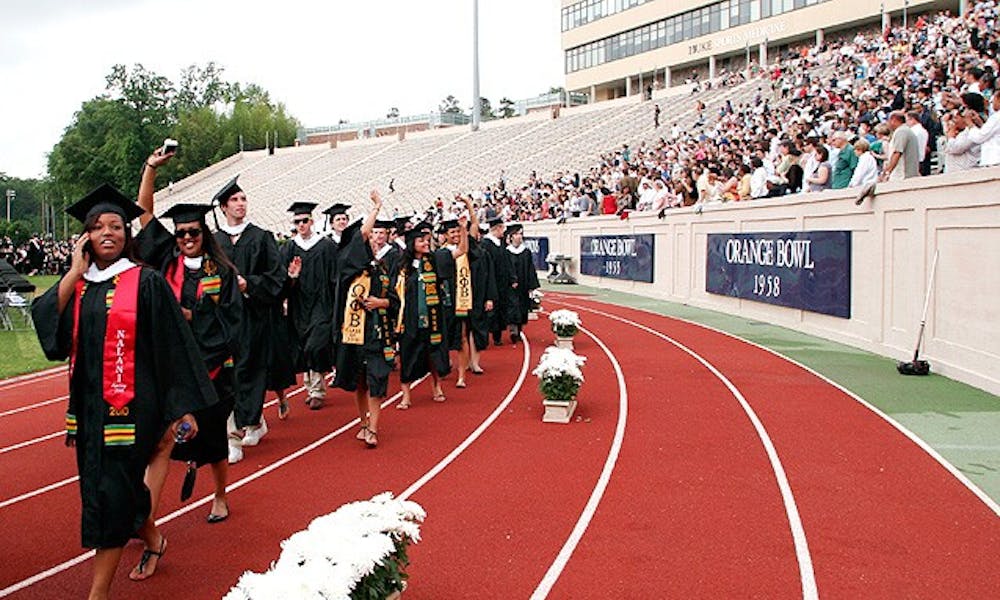Cloudy skies surrounded Wallace Wade Stadium as more than 3,500 students received undergraduate, graduate or professional degrees Sunday.
Inside the stadium, however, the future was bright. President Richard Brodhead, commencement speaker Muhammad Yunus and student speaker David Distenfeld urged graduates to make the most of their lives after Duke.
“As you write the story of your life, I trust you will build on the hopes and aspirations that you sketched out on this magical campus,” Brodhead said after conferring degrees. “You have the talent, Duke gave you the tools, time for you to do the builders’ work.”
Yunus, a Bangladeshi banker who is considered the father of microfinance, encouraged the Class of 2010 to take advantage of those tools, especially the “technology” graduates have in their hands.
“Technology is like a vessel, it is like a car. It is the driver who decides where you want to take it,” said Yunus, who received an honorary degree at Sunday’s ceremonies. “If you want to use this technology to make money, it will take you to make money. If you want to take this technology to change the world, to make a better world, definitely it will take you there. It is your choice what you want to do with it.”
In his speech, Yunus discussed how he established the Grameen Bank in Bangladesh because he believed in empowering the poor. Yunus and Grameen Bank went on to jointly receive the 2006 Nobel Peace Prize for their bottom-up approach to banking. Yunus added that he did not know much about banking when he unexpectedly entered the field, which ended up helping him.
“I didn’t have to follow the rules,” he said. “These big banks told me back in 1976, ‘Banks cannot lend money to the poor because they are not credit worthy.’ So I started asking people in New York, ‘Can you tell me who are credit worthy now?’”
Distenfeld, who graduated summa cum laude and was a member of Duke University Improv, does not have the experience in banking that Yunus has, but he offered similar advice. Distenfeld used the “Yes, and...” improv technique to speak broadly about the Class of 2010’s experience at Duke.
“So much of my Duke experience has been unrehearsed, completely unscripted,” Distenfeld said. “Improv can teach us all how to successfully navigate life after Duke. ‘Yes, and...’ teaches us to not just accept the world we live in, but to also find ways to make it a better place.”
Distenfeld provided many examples of this principle in action, from the way Duke Athletics built on Cameron Crazies’ enthusiasm with this year’s Countdown to Craziness event to a short film Distenfeld made with a friend sophomore year. Distenfeld said the film eventually collected almost five million views on YouTube and helped raise thousands of dollars for pediatric cancer research.
“The concept of ‘Yes, and...’ was both entertaining and also a good explanation of what we should do with our lives,” said graduating senior Upom Malik.
In addition to Yunus, four other scholars and public officials received honorary degrees. Among them were Temple Grandin, an expert in humane livestock facilities design and animal behavior, and Joel Klein, chancellor of the New York City Department of Education whose Children First initiative works to improve the district’s educational quality. Alasdair MacIntyre, a moral philosopher who taught at Duke, and Sir John Pendry, a physicist who used the field of metamaterials to help create a practical “invisibility cloak,” also received honorary degrees.
Katie Griswold, mother of graduating senior Caroline Griswold, said commencement reflected “$160,000 well spent.” “The focus of Duke is clearly on using your talents and skills to do good things for the little guy in the world,” Katie Griswold said.
Bill Kohler, the grandfather of graduating twins Laura and Elizabeth Duncan, said the entire graduation weekend—which has been full of receptions and services—was uplifting. He added that the ceremonies and speeches were better than his daughter’s 1986 graduation from Duke.
“All the challenges [graduating students] were given were very appropriate,” Kohler said.
Although they were in town to enjoy commencement, friends and family of the graduates provide a strong boost to Durham’s economy, according to a Duke news release. Visitors spend an estimated $3.2 million on expenditures like food and hotel rooms, and they will also leave about $140,750 in local tax revenues for the city and county, the news release said.
Yunus also discussed profits in his speech, reminding graduates that they have the option to work for profit-making companies or social businesses built on the principle of selflessness.
“Each individual, each human being, has the power—the enormous power—to change the world, and you have it,” Yunus concluded. “Are you going to use that power to change the world? That is the question I leave with you.”
Chief John Dailey of the Duke University Police Department wrote in an e-mail Wednesday that two people were transported to the Emergency Department during commencement, one for heat and one for another condition.
Get The Chronicle straight to your inbox
Signup for our weekly newsletter. Cancel at any time.

